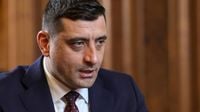In Romania, citizens once again headed to the polls on May 4, 2025, to elect a new president after the previous election was annulled. The political landscape has shifted dramatically, with George Simion, the leader of the Alliance for the Union of Romanians (AUR), emerging as a strong contender. Polls indicate that he is currently leading with approximately 40 percent of the votes, a significant increase from his previous performance in the annulled election.
The backdrop to this election is fraught with controversy. The previous election saw the pro-Russian, ultra-right candidate Călin Georgescu unexpectedly win, only for the Romanian Constitutional Court to nullify the results amid allegations of foreign interference, specifically a TikTok campaign allegedly funded by Russia. Despite the lack of concrete evidence, the court's decision to disqualify Georgescu from the rerun has drawn criticism, with many viewing it as a blow to democracy in Romania.
Simion, who previously finished fourth in the annulled election, has now allied himself with Georgescu, gaining momentum and support from Georgescu's former voters. The two candidates have appeared together at campaign events, presenting a united front against their opponents. Simion's rise in the polls is attributed to a consolidation of right-wing support, with many former Georgescu voters shifting their allegiance to him.
In this election, the stakes are high, not just for Romania but for the European Union and NATO as well. As a member of both organizations, Romania has played a crucial role in supporting Ukraine during the ongoing Russian aggression. Simion's policies, however, raise concerns about Romania's future alignment with Western allies. He has publicly rejected military aid for Ukraine and has called for the territorial restoration of Greater Romania, which historically included parts of Moldova and Ukraine.
Simion's rhetoric has alarmed many observers, who fear that his presidency could lead to Romania distancing itself from NATO and the EU. "We have written history together today," Simion declared in a video message following the election results, indicating his aspirations for a significant political shift in the country.
As the election results were being tallied, Crin Antonescu, the candidate from the pro-European coalition, was neck-and-neck with Nicușor Dan, the independent mayor of Bucharest, for the opportunity to challenge Simion in the runoff scheduled for May 18. Antonescu garnered approximately 21 percent of the votes, while Dan closely followed with 20 percent. The final results, particularly the votes from Romanians living abroad, are expected to play a decisive role in determining who will face Simion in the second round.
Experts have pointed out that the high turnout among the diaspora could favor Simion, who is perceived as having strong support among these voters. The diaspora's voting power has surged in this election, reflecting a growing engagement with Romanian politics from abroad.
The political climate in Romania has been further complicated by allegations of disinformation campaigns and dirty tricks during the campaign. Observers note that the rise of right-wing extremism in Romania is not just a local issue but part of a broader trend seen across Europe, where populist and nationalist movements are gaining traction.
Simion's campaign has also been marked by a rejection of the political establishment, resonating with voters disillusioned by traditional parties. He has positioned himself as a candidate for nationalistic voters, tapping into a wave of anger towards established politicians and promising to restore Romania's dignity and sovereignty.
Internationally, Simion's potential presidency raises alarms among NATO and EU officials. His previous statements, including downplaying the threat posed by Russia, have sparked concerns about Romania's future role within these alliances. Simion has claimed that Russia does not pose a significant threat to NATO, suggesting that the real danger lies within the liberal West.
As the election moves into its second round, the pro-European coalition faces challenges in uniting its fragmented base. The campaign has been marred by accusations and negative tactics, leaving the pro-European candidates at a disadvantage. Political analysts warn that a divided opposition could pave the way for Simion to secure a decisive victory in the runoff.
In the lead-up to the election, the Romanian authorities promised fair and transparent elections, particularly in light of the previous annulment. They have increased collaboration with social media platforms like TikTok to prevent misinformation and ensure a smooth electoral process.
As the clock ticks down to the runoff, all eyes are on Romania. The outcome of this election could have profound implications not only for the country's domestic politics but also for its relationships with the EU and NATO. The potential for a far-right government in Romania raises questions about the future of democracy in the region and the stability of European alliances.
With the polls closing at 9 PM local time, the anticipation builds as the first results are expected later in the evening. The political future of Romania hangs in the balance, with voters hoping to shape a path forward that aligns with their vision for the country.

